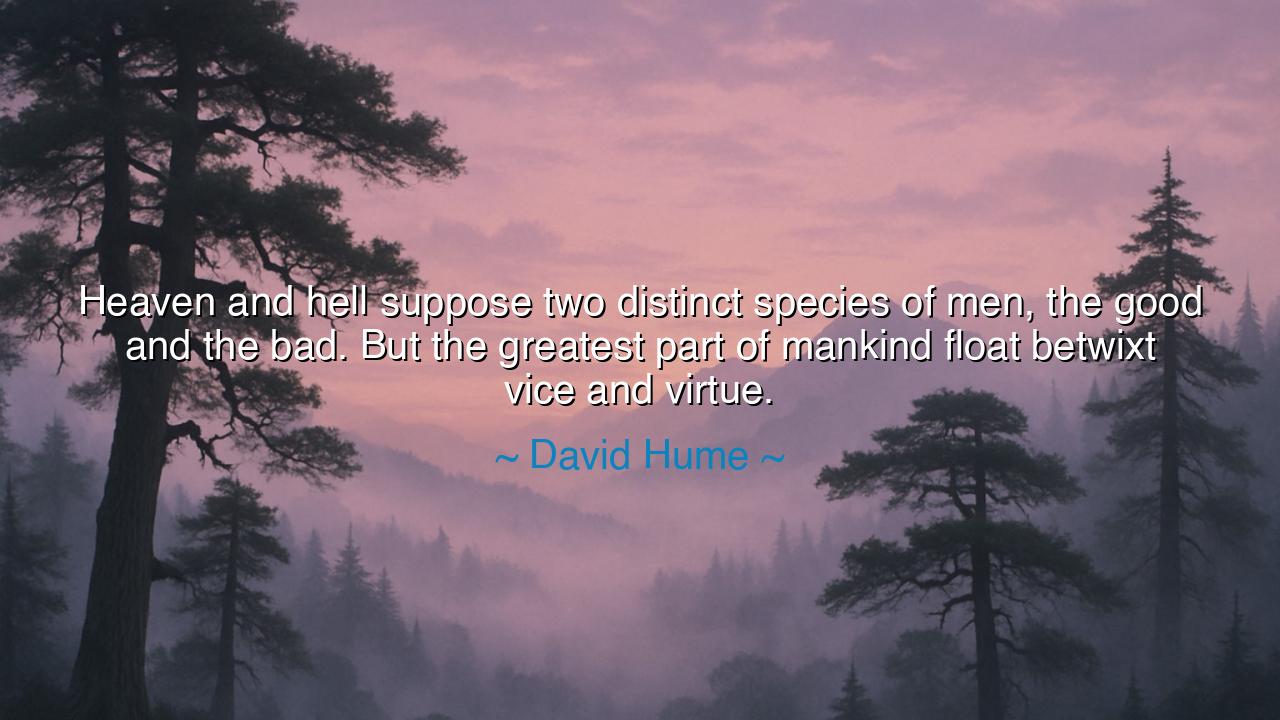
Heaven and hell suppose two distinct species of men, the good and
Heaven and hell suppose two distinct species of men, the good and the bad. But the greatest part of mankind float betwixt vice and virtue.






"Heaven and hell suppose two distinct species of men, the good and the bad. But the greatest part of mankind float betwixt vice and virtue." Thus spoke David Hume, the great Scottish philosopher of the Enlightenment, whose vision of human nature was both honest and profound. In this statement, he stripped away illusion and faced the soul of man as it truly is — neither angel nor demon, but a creature of mixture, a vessel of both light and shadow. The words are not cynical; they are compassionate, for Hume understood that moral perfection and total corruption are rare. The truth of humanity lies in the in-between, in the restless struggle between virtue and vice that defines our days.
In these words, Hume challenges the simplistic division that has haunted the minds of men for ages — the belief that the world can be neatly divided into the righteous and the wicked, the saved and the damned. He reminds us that life is not so easily judged. Every man carries within him both Heaven and Hell, both nobility and frailty. It is not our nature to dwell entirely in one realm or the other, but to wander between them, striving for the good yet often succumbing to weakness. In that wandering — that tension — lies the essence of what it means to be human.
The philosopher spoke from an age of reason, when thinkers sought to understand morality not as divine decree, but as a pattern woven through the heart of man. Hume saw that morality was not a matter of rigid division, but of balance and intention. The saint is not free of temptation, and the sinner is not devoid of goodness. The soul, he taught, is like a ship on a stormy sea — it drifts, it sways, it sometimes loses its course. And yet, the journey itself has meaning, for every choice we make — whether toward light or shadow — shapes the waters through which we sail.
Consider the life of Marcus Aurelius, the philosopher-emperor of Rome. Though revered for his wisdom and discipline, even he confessed to the war within his spirit. In his Meditations, he wrote of his frustration with anger, of his struggle to remain just and patient amid the burdens of rule. He was no saint immune to vice, but a man who wrestled daily with his own imperfection. And yet, it was precisely this struggle that gave his virtue its depth. For virtue untested is no virtue at all. The greatest souls are not those untouched by sin, but those who labor earnestly to rise above it.
Hume’s words also carry a quiet warning — to beware of those who claim to be purely good or purely righteous. The world has seen many who, in the name of Heaven, have done the work of Hell. Those who believe themselves beyond fault are often the ones most enslaved by pride. The wise man, by contrast, knows his own shadow and keeps it in sight. He does not despair because he sins, nor boast because he acts rightly. He walks humbly, knowing that he floats — as all mankind does — between the two poles of virtue and vice.
This truth should not sadden us, but free us. For if we accept that perfection is beyond reach, then we can begin the nobler task of progress. We can strive not to be flawless, but to be better. To forgive ourselves when we fall, and to rise again with purpose. The divine does not ask us to be without fault; it asks us to seek the good despite our faults. To live in awareness of our imperfection is to live truthfully — and from truth, goodness grows.
So, my child, remember this teaching: you are neither saint nor sinner, but both, intertwined. The battle between virtue and vice will never cease within you — nor should it. It is this very conflict that sharpens the soul, that keeps the heart alive and striving. Do not despise your weakness; let it teach you compassion. Do not grow proud of your strength; let it remind you to be gentle. True wisdom lies in the balance, in walking the middle path with courage and humility.
For as Hume wrote, the greatest part of mankind float betwixt vice and virtue. The goal is not to escape this tide, but to steer your course through it with steady hands. Let each day be an act of choosing — choosing kindness over cruelty, honesty over deceit, forgiveness over bitterness. And though you may drift, as all men do, let your compass always point toward the light. For the measure of a life is not in never falling, but in how faithfully one rises again — forever afloat, yet forever seeking Heaven.






AAdministratorAdministrator
Welcome, honored guests. Please leave a comment, we will respond soon